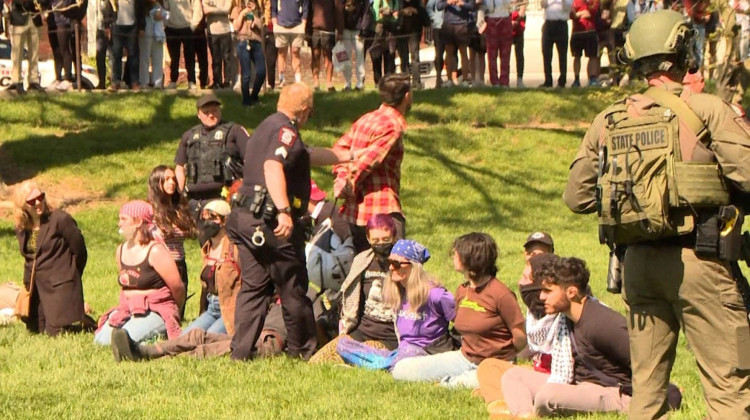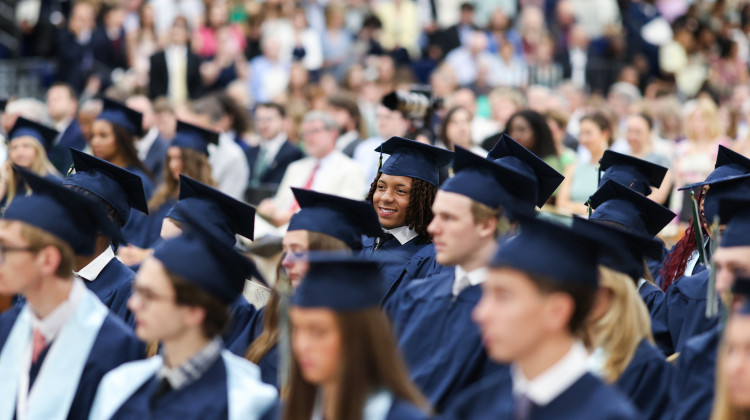
Schools across Indiana have dealt with a lot in 2021, from troubling TikTok trends and social issues, to teacher pay and ongoing COVID-19 disruptions.
(Jeanie Lindsay/IPB News)This year saw the end of the first full school year affected by the pandemic, more state education funding specifically to raise teacher pay, and a lot more attention given to schools for how they've handled COVID-19 and other issues. A lot changed for Hoosiers, and several trends affected schools in interesting or challenging ways.
Here's a review of some of the most notable and important issues that made headlines in 2021, before we ring in the new year:
Changes at the top
Indiana got a new education secretary in January, as former Superintendent of Public Instruction Jennifer McCormick finished her first and final term as the state's schools chief.
Gov. Eric Holcomb appointed his education advisor Katie Jenner to the role, who chairs the Indiana State Board of Education as part of the position. The board and the department are now overseeing the development of the state's new Graduates Prepared to Succeed school performance dashboard, which is expected to roll out sometime in the second half of 2022.
A more recent announcement is previewing an upcoming change; in November, long-time Commissioner for Higher Education Teresa Lubbers shared plans to step down after the upcoming legislative session ends in March 2022.
Funding and legislation
The 2021 legislative session was a big one, as lawmakers made decisions about the state's two year budget and how much of it should go to schools. Lawmakers approved millions of new education dollars – and for the first time earmarked some of it specifically to raise teacher pay. But another budget item was more controversial; lawmakers also approved a hotly debated expansion of school choice.
Join the conversation and sign up for the Indiana Two-Way. Text "Indiana" to 73224. Your comments and questions in response to our weekly text help us find the answers you need on statewide issues.
Democrats in Congress also approved more relief funding to help communities continue addressing challenges caused by – or made worse from – COVID-19, which included massive amounts of funding for schools that will last until 2023.
Spring tests and online learning
The year started in the middle of the pandemic's first full school year, with burnt out teachers doing their best to make it to summer after a year of hybrid learning. Students took ILEARN for the first time since 2019 – which later revealed just how much the pandemic disrupted classrooms.
As the year went on, families made the best of and reflected on a year of online learning, and many grappled with decisions about sending their kids back to school buildings.
Hoosiers' understanding about the full effects of the pandemic on education also continued to grow, including its role in ongoing problems impacting different groups of students.
Controversy over mask mandates, Black Lives Matter, and school boards
It wasn't just the first full pandemic school year that came to an end over the summer – the governor's statewide school mask mandate ended in June too, turning up the heat for local school leaders.
As conversations about health and safety protocols continued, some schools and communities debated the role of police in schools and issues about race.
Some school leaders defended efforts to be more equitable and inclusive as misinformation about critical race theory and social emotional learning boiled over. Not every school board experienced shouting matches or arrests, but especially tense situations from board meetings across the country made national headlines, and prompted some to urge for civility while others called for investigations.
The attention was enough for Indiana's Attorney General Todd Rokita to weigh in, issuing a Parents' Bill of Rights that covers a wide range of topics from COVID-19 protocols and vaccines, to curriculum and social emotional learning.
But some educators, experts, and community leaders have said the document – in addition to an advisory opinion Rokita issued on Black Lives Matter – is racist, perpetuates misinformation, and fans the flames of mistrust between schools and parents.
Students also organized Black Lives Matter protests as some schools moved to take down posters with the phrase, before and after Rokita issued his opinion.
Child care and after school grant funding
Child care was hit hard, and organizations awarded millions of grant dollars to support providers and families – after identifying critical shortages across Indiana. Staffing has continued to plague providers, but some hope that the grants and other partnership opportunities can help fix long-standing problems in the industry.
The state also awarded grants to after school programs, aiming to use additional COVID-19 relief to boost student learning. Staff shortages have made it challenging for some of those programs to expand or reach all students, but program providers hope the temporary influx of relief funding can help them recruit new hires to serve kids who need it the most.
Teacher pay, staff shortages, and supply chain problems
A lot of Hoosier teachers received pay raises this fall, many by thousands of dollars. But support staff demanded higher pay too, and schools have struggled to fill vacancies for bus drivers and meal service positions, among many others.

Despite staff shortages that have caused transportation delays or forced schools to go remote, schools have still managed to serve millions of meals and get creative amidst supply chain problems that limited their ability to access certain food products or supplies.
Troubling TikTok trends
A TikTok trend encouraged students to damage or take school property as the school year started, and while Hoosier schools didn't experience too much of it, concerns swirled among school leaders and parents nationwide about how well students are faring during COVID-19.
Concerns grew once again in mid-December after TikTok threats spurred reactions from school leaders across the country, which some say highlights the importance of mental health support for students as they continue grappling with the effects of the pandemic.
COVID-19 in schools, vaccines, and more mask changes
Teachers became eligible for COVID-19 vaccines this spring, and cases started to slow as summer hit. The governor's school mask order expired in June, and as summer continued to see a slower spread of COVID-19, many school leaders – feeling optimistic about the pandemic's end – relaxed protocols ahead of the fall semester.
The start of the new school year was chaotic for many. Schools quarantined entire classrooms or buses of kids, and some were forced to go back online for a short time. State officials responded by offering a trade-off – mask requirements for relaxed quarantine rules – which brought a lot of kids back into classrooms.
But new variants have challenged leaders as they try to limit the spread – Hoosier schools reported more cases this fall semester than they did all of last school year.
And as we've neared the end of 2021, schools have begun changing their mask policies again after all school-aged children became eligible for COVID-19 vaccinations.
Contact reporter Jeanie at jlindsa@iu.edu or follow her on Twitter at @jeanjeanielindz.
 DONATE
DONATE






 Support WFYI. We can't do it without you.
Support WFYI. We can't do it without you.